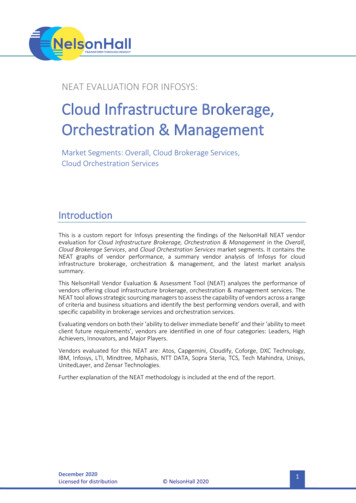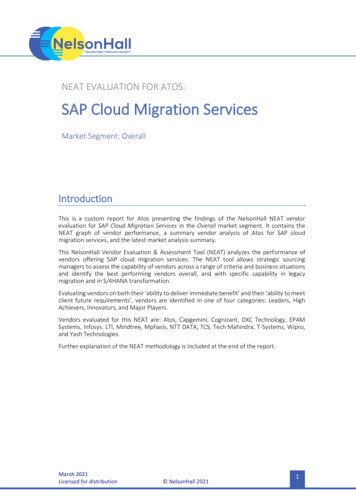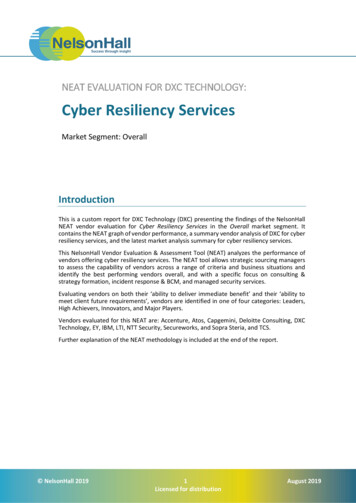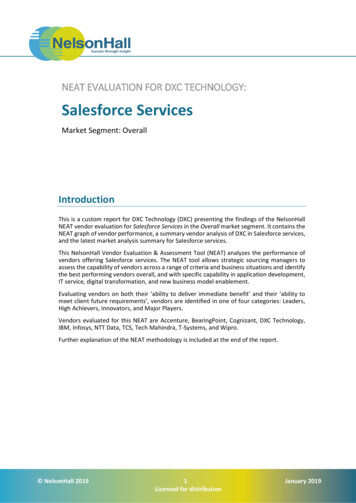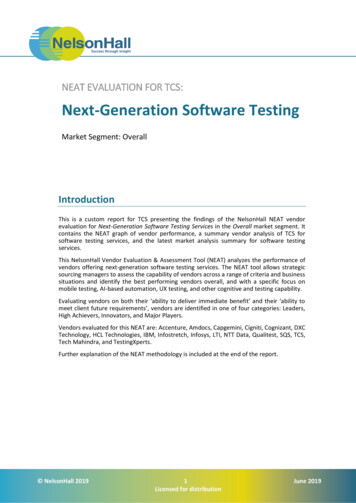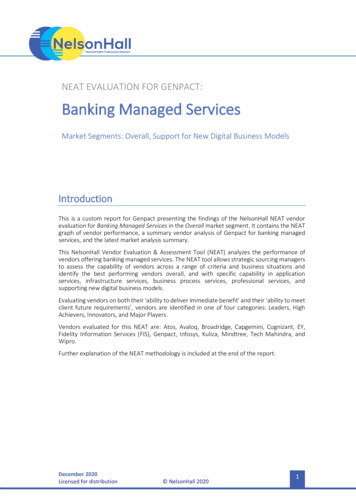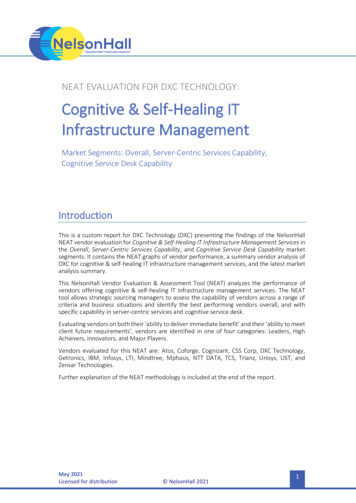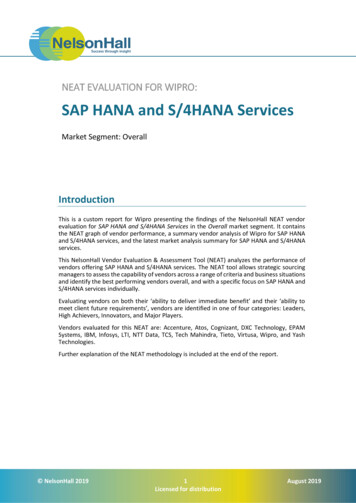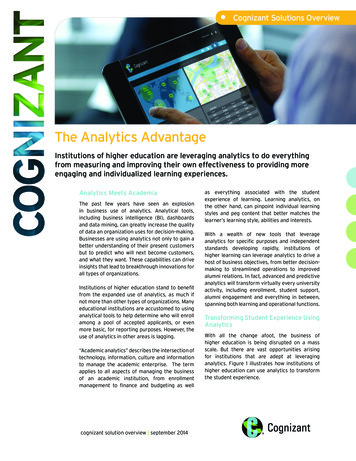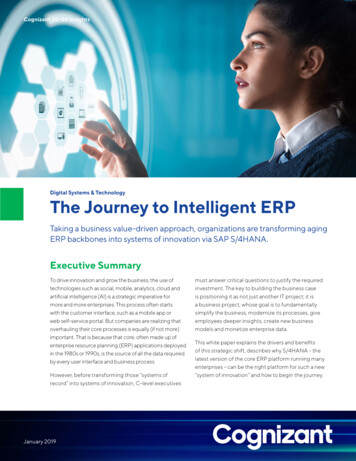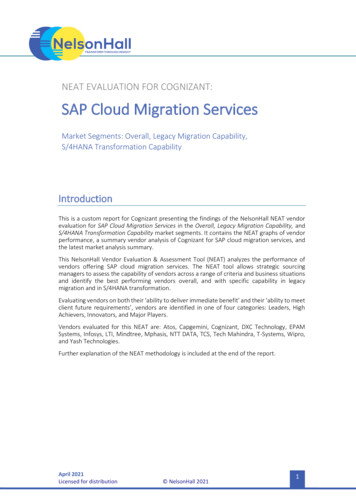
Transcription
NEAT EVALUATION FOR COGNIZANT:SAP Cloud Migration ServicesMarket Segments: Overall, Legacy Migration Capability,S/4HANA Transformation CapabilityIntroductionThis is a custom report for Cognizant presenting the findings of the NelsonHall NEAT vendorevaluation for SAP Cloud Migration Services in the Overall, Legacy Migration Capability, andS/4HANA Transformation Capability market segments. It contains the NEAT graphs of vendorperformance, a summary vendor analysis of Cognizant for SAP cloud migration services, andthe latest market analysis summary.This NelsonHall Vendor Evaluation & Assessment Tool (NEAT) analyzes the performance ofvendors offering SAP cloud migration services. The NEAT tool allows strategic sourcingmanagers to assess the capability of vendors across a range of criteria and business situationsand identify the best performing vendors overall, and with specific capability in legacymigration and in S/4HANA transformation.Evaluating vendors on both their ‘ability to deliver immediate benefit’ and their ‘ability to meetclient future requirements’, vendors are identified in one of four categories: Leaders, HighAchievers, Innovators, and Major Players.Vendors evaluated for this NEAT are: Atos, Capgemini, Cognizant, DXC Technology, EPAMSystems, Infosys, LTI, Mindtree, Mphasis, NTT DATA, TCS, Tech Mahindra, T-Systems, Wipro,and Yash Technologies.Further explanation of the NEAT methodology is included at the end of the report. NelsonHall 2020April 2021Licensed for distribution1 NelsonHall 2021Licensed for distributionMarch 20201
NEAT Evaluation for Cognizant: SAP Cloud Migration ServicesNEAT Evaluation: SAP Cloud Migration Services (Overall)NelsonHall has identified Cognizant as a Leader in the Overall market segment, as shown inthe NEAT graph. This market segment reflects Cognizant’s overall ability to meet future clientrequirements as well as delivering immediate benefits to its SAP cloud migration servicesclients.Leaders are vendors that exhibit both a high capability relative to their peers to deliverimmediate benefit and a high capability relative to their peers to meet future clientrequirements.Buy-side organizations can access the SAP Cloud Migration Services NEAT tool (Overall) here.April 2021Licensed for distribution NelsonHall 20212
NEAT Evaluation for Cognizant: SAP Cloud Migration ServicesNEAT Evaluation: SAP Cloud Migration Services(Legacy Migration Capability)NelsonHall has identified Cognizant as a Leader in the Legacy Migration Capability marketsegment, as shown in the NEAT graph. This market segment reflects Cognizant’s ability to meetfuture client requirements as well as delivering immediate benefits to its SAP cloud migrationclients with specific capability in legacy migration services.Buy-side organizations can access the SAP Cloud Migration Services NEAT tool (LegacyMigration Capability) here.April 2021Licensed for distribution NelsonHall 20213
NEAT Evaluation for Cognizant: SAP Cloud Migration ServicesNEAT Evaluation: SAP Cloud Migration Services(S/4HANA Transformation Capability)NelsonHall has identified Cognizant as a Leader in the S/4HANA Transformation Capabilitymarket segment, as shown in the NEAT graph. This market segment reflects Cognizant’s abilityto meet future client requirements as well as delivering immediate benefits to its SAP cloudmigration clients with specific capability in S/4HANA transformation services.Buy-side organizations can access the SAP Cloud Migration Services NEAT tool (S/4HANATransformation Capability) here.April 2021Licensed for distribution NelsonHall 20214
NEAT Evaluation for Cognizant: SAP Cloud Migration ServicesVendor Analysis Summary for CognizantOverviewCognizant has positioned as an integrated service provider, combining insight and advisoryconsulting services, industry skills & knowledge, a culture of innovation and agility, and at-scaleIT and service operations.In 2017, Cognizant realigned its offerings into three broad practice areas, each headed by apresident, all positioning on helping clients with their digital transformation agendas: Digital Business: includes the Digital Works unit set up in 2015. Key investments were indesign, analytics, and data scientists; expanding the number of ‘Collaboratories’ globally Digital Systems & Technology: focused on modernizing, securing, and scaling legacytechnology environments (e.g., migrating to AWS), and in the use of automation/AI Digital Operations: includes cloud-based offerings and platforms businesses such asTriZetto.Cognizant initiated its focus on SAP ERP cloud capabilities in 2011, creating a dedicated SAPcloud practice and building out a proof of concept offering. It gained its first client for thisoffering in 2014. Through 2016 it focused its effort on cloud migration to address specificchallenges being seen in on-premise SAP environments.Beginning in 2016, the focus of this team began to shift to be primarily targeted at enablingthe adoption of HANA and S/4HANA in the cloud. In 2018, this expanded to focus beyondinfrastructure cost reduction initiatives to target improving client visibility to real-timeoperational data for use in analytics.In parallel, it also began evolving its delivery capabilities to include simplified consumptionbased pricing and to better leverage new, agile ways of working. It has also focused on buildingout industry-tailored offerings to simplify and accelerate client adoption.While Cognizant has not made acquisitions specifically targeted at expanding its SAPcapabilities, several of its acquisitions do impact its delivery of these services, including thefollowing: Digital engineering capabilities: in November 2018, Cognizant acquired SoftVision for 550m, bringing in 2,800 personnel, specialist capabilities, and scale in softwareengineering, including an extensive nearshore capability in Romania that Cognizant canuse to serve European clients Azure migration: in 2020, Cognizant acquired both 10th Magnitude and New Signature tofocus its capabilities in support of Microsoft Azure, the most commonly selected publiccloud provider leveraged for SAP cloud migration by Cognizant clients to date DevOps: in 2019, Cognizant acquired Contino, which brings 350 employees focused onDevOps, cloud-native development, and data platforms across the U.K., U.S., and Australia.Cognizant has defined a broad set of offerings that spans the full lifecycle of cloud adoption,including consulting, assessment, planning, migration/implementation, management, andoperations. It does this through sets of specific offerings and assets to address individualmigration activities and bundled as end-to-end services. These bundled services reflect thedifferent objectives that Cognizant sees clients looking to realize.April 2021Licensed for distribution NelsonHall 20215
NEAT Evaluation for Cognizant: SAP Cloud Migration ServicesFinancialsFor CY 2019, Cognizant had total revenues of 16.8bn.NelsonHall estimates that Cognizant's 2019 SAP ERP cloud services revenues accounted for 105m. NelsonHall further estimates 2020 SAP ERP cloud services revenues to be 120m.Strengths Globally broad delivery network Close partnership with Microsoft and strong SAP on Azure credentials Broad set of mature proprietary migration tools Mature industry-tailored offerings.Challenges Delivery model weighted to remote delivery Limited Europe-based SAP cloud employee base.Strategic DirectionTo evolve and improve its SAP ERP cloud migration business, Cognizant is focusing on thefollowing strategic initiatives over the next 12 to 24 months: Continuing to expand assets and offerings: leveraging its innovation functions such as theSAP Digital HANA Labs, Cognizant is looking to continue to expand and mature its portfolioof assets and offerings in support of SAP cloud migration. This includes the intelligententerprise platform offering, SmartMove migration automation, and intelligent ERPmodernization QA offering (in partnership with Tricentis) Investing in growing digital engineering for the cloud: with acquisitions such as SoftVisionand Contino that have grown its digital engineering and DevOps capabilities, Cognizant islooking to better integrate these capabilities into its SAP services Expanding the skilled workforce: Cognizant is focusing on expanding its SAP cloud skilledresource footprint. It has targets to grow its business 30% per year going forward and istherefore looking to grow its skilled headcount in line to enable this. It is primarily lookingto achieve this through upskilling and cross-skilling of existing employees rather than goingto the market, given the limited skills available. Other skill areas it is looking to improvewithin its headcount are project management and DevOps.April 2021Licensed for distribution NelsonHall 20216
NEAT Evaluation for Cognizant: SAP Cloud Migration ServicesOutlookCognizant has focused on SAP cloud migration since 2011, providing it with a mature offeringand delivery framework. This length of time has enabled it to build out a broad portfolio ofofferings and assets. With specific assets and capabilities built to automate and simplify thecloud adoption process, Cognizant presents a compelling offering to clients.While it sees adoption grow fastest in North America, Europe possesses a broad SAP clientfootprint and, under GDPR regulations, has a unique cloud-adoption environment. As EMEAhas its smallest resource footprint, Cognizant is investing in growing out its resource base,including client-proximate teams. Growing its client-proximate resource base also helpsalleviate any concern among clients about Cognizant's heavily remote delivery model.Cognizant's broad global delivery footprint, including specific region-tailored nearshorecenters, also helps address any concerns about a nearly 100% remote delivery model.Cognizant also possesses a strong relationship with Microsoft and a breadth of experiences inmigrating SAP to Azure. This relationship and potential joint go-to-market provide Cognizantwith strong reference experiences for new clients.With the majority of SAP cloud migrations also meaning the adoption of S/4HANA, Cognizant'sassets for S/4HANA adoption are also of value in cloud adoption. Its industry-tailored offeringsprovide an avenue for clients to accelerate the adoption of S/4HANA (and the cloud) while alsoimplementing functionality tailored specifically to the demands of the client's sector.April 2021Licensed for distribution NelsonHall 20217
NEAT Evaluation for Cognizant: SAP Cloud Migration ServicesSAP Cloud Migration Services Market SummaryOverviewHistorically, the most common path used to migrate SAP ERP to the cloud has been migrationof legacy ERP landscapes with minimal transformation. At most, transformation was themigration of the database to HANA or the OS. Over the last two years, with the increasingadoption of S/4HANA, it is taking on an increasing proportion of SAP cloud adoptions, whetherthrough migration of a legacy environment or through a new implementation on the cloud.However, NelsonHall estimates it still represents less than 40% of SAP ERP cloud migrationscompleted by vendors to date.Clients that have undertaken the migration or adoption of SAP ERP landscapes in cloudenvironments have most commonly realized value through the reduction of IT and ERP costs.The shift from on-premise infrastructure to a cloud landscape with the ability to scale up anddown to meet demand and eliminate ongoing operations and maintenance allows clients torealize IT cost savings of 20-30% on average.Vendors are expanding their portfolio of cloud adoption offerings to ensure their portfolio hasthe breadth to meet client needs. A technical lift and shift of a legacy SAP ERP environmenthas been the starting point for ERP cloud adoption offerings, but now leading vendors areoffering bundled offerings that provide an industrialized migration to a new landscape preconfigured to address specific industry or functional requirements.To deliver these services, IT service vendors are investing heavily in their SAP ERP cloudmigration capabilities. These investments are frequently focused in four main areas: Transforming the skillsets of their teams Evolving cloud-focused offerings Evolving and maturing assets and tools Expanding portfolio of industry-focused offerings.Buy-Side DynamicsThe key capabilities sought by organizations in selecting a vendor to deliver SAP cloudmigration services are: Experience delivering equivalent services in geography/industry Remote SAP ERP cloud migration capabilities Flexibility in commercial arrangements Demonstrated business case value achievement Automated migration tools.April 2021Licensed for distribution NelsonHall 20218
NEAT Evaluation for Cognizant: SAP Cloud Migration ServicesMarket Size & GrowthThe market for SAP ERP cloud migration services is poised to grow 16.6% CAAGR to reach 19.4bn by 2025.After a spending slowdown in 2020 revenues as the COVID-19 pandemic delays SAPtransformation investments, clients will return to a focus on SAP ERP cloud migration servicesin 2021 as it is seen as a path to both drive cost reduction and position the firm for furtherdigital transformation. In parallel, as the 2027 end of support deadline comes closer, S/4HANAadoption will see faster growth to take on a larger proportion of the market.Success FactorsThe key success factors for SAP ERP cloud migration services vendors include: Automated migration assets: Successful vendors have assets that automate activitieswithin the migration effort to simplify and accelerate service delivery. Primary focus areasinclude landscape assessment, data migration, cloud provisioning and code remediation Tailored offerings: Successful vendors have developed a set of offerings tailored to clients’specific sector or functional requirements to increase the value of migration. These includeindustry functional extensions and bundled offerings tailored to provide all necessarycapabilities for a target industry Flexible delivery framework: As clients are taking a diverse set of paths to move ERPlandscapes to cloud environments, vendors need to have methodologies, tools andapproaches that are adaptable to whatever path is taken by the client Broad partner ecosystem: Vendors are supplementing core partnerships with SAP and allkey hyperscalers (AWS, Azure and GCP) with other more targeted hyperscalers (ex. Alibabafor China and APAC) and migration tool vendors such as SNP Group Business, process and OCM consulting: In parallel with migrating at least some portion oftheir ERP landscape to a cloud environment, clients are frequently looking to also add newcapabilities or transform their processes. To realize the value of these changes, clientsneed to transform not just the technology landscape but also processes and organization.Vendors must be positioned and capable of supporting these broader transformationobjectives.OutlookMany clients have invested in and evolved their legacy ERP landscapes over many years tocustomize to their specific requirements. This customization and the large amount of data insystems significantly increases the complexity of migration. This complexity increases theeffort and risk to migrate either to a cloud landscape or in transforming it to S/4HANA inparallel with a cloud migration.After the onset of the pandemic and the attendant economic uncertainty, clients areincreasingly focusing on rapid value realization rather than solely on longer, broadertransformational objectives. In defining a migration roadmap, vendors need to ensure that theclient is realizing interim value throughout each phase of the migration to maintain buy-inacross the organization.April 2021Licensed for distribution NelsonHall 20219
NEAT Evaluation for Cognizant: SAP Cloud Migration ServicesThe future direction of the market will include the following: Transforming from legacy SAP ERP to S/4HANA becomes the majority cloud migrationapproach Cloud migration approaches primarily bifurcate into two models: Adopting pre-configured all-in-one, tailored S/4HANA landscapesDe-coupling incremental capabilities to be hosted in public cloud with slimmed downdigital core, on-premise or in private cloud Hyperscaler becomes first choice cloud destination for transformed landscapes Objectives will be focused on implementing new capabilities such as IoT, AI/ML andanalytics to improve business operations Greater adaptability of ERP landscape enables companies to pursue new business modelsas opportunities arise End-to-end migration and operations packaged as a single-cost engagement Fully automated discovery and assessment develops a detailed understanding of objectsrequiring transformation for cloud and S/4HANA, and then is able to automatically executeremediation and migration of objects Target landscape is pre-configured to industry-specific requirements and supplementedby additional functional extensions and new capabilities that expand value of system De-coupled legacy system is extended with cloud-based functionality, but acts as the firstphase of the ultimate journey to S/4HANA in the cloud.April 2021Licensed for distribution NelsonHall 202110
NEAT Evaluation for Cognizant: SAP Cloud Migration ServicesNEAT Methodology for SAP Cloud Migration ServicesNelsonHall’s (vendor) Evaluation & Assessment Tool (NEAT) is a method by which strategicsourcing managers can evaluate outsourcing vendors and is part of NelsonHall's Speed-toSource initiative. The NEAT tool sits at the front-end of the vendor screening process andconsists of a two-axis model: assessing vendors against their ‘ability to deliver immediatebenefit’ to buy-side organizations and their ‘ability to meet client future requirements’. Thelatter axis is a pragmatic assessment of the vendor's ability to take clients on an innovationjourney over the lifetime of their next contract.The ‘ability to deliver immediate benefit’ assessment is based on the criteria shown in Exhibit1, typically reflecting the current maturity of the vendor’s offerings, delivery capability,benefits achievement on behalf of clients, and customer presence.The ‘ability to meet client future requirements’ assessment is based on the criteria shown inExhibit 2, and provides a measure of the extent to which the supplier is well-positioned tosupport the customer journey over the life of a contract. This includes criteria such as the levelof partnership established with clients, the mechanisms in place to drive innovation, the levelof investment in the service, and the financial stability of the vendor.The vendors covered in NelsonHall NEAT projects are typically the leaders in their fields.However, within this context, the categorization of vendors within NelsonHall NEAT projects isas follows: Leaders: vendors that exhibit both a high capability relative to their peers to deliverimmediate benefit and a high capability relative to their peers to meet future clientrequirements High Achievers: vendors that exhibit a high capability relative to their peers to deliverimmediate benefit but have scope to enhance their ability to meet future clientrequirements Innovators: vendors that exhibit a high capability relative to their peers to meet futureclient requirements but have scope to enhance their ability to deliver immediate benefit Major Players: other significant vendors for this service type.The scoring of the vendors is based on a combination of analyst assessment, principally aroundmeasurements of the ability to deliver immediate benefit; and feedback from interviewing ofvendor clients, principally in support of measurements of levels of partnership and ability tomeet future client requirements.Note that, to ensure maximum value to buy-side users (typically strategic sourcing managers),vendor participation in NelsonHall NEAT evaluations is free of charge and all key vendors areinvited to participate at the outset of the project.Apr
NEAT Evaluation: SAP Cloud Migration Services (Overall) NelsonHall has identified Cognizant as a Leader in the Overall market segment, as shown in the NEAT graph. This market segment reflects Cognizant’s overall ability to meet future client requirements as well as delivering immedi
